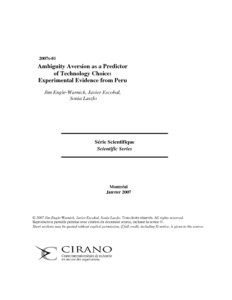Ambiguity aversion as a predictor of technology choice: experimental evidence from Peru
| Year | : | 2007 |
|---|---|---|
| Author/s | : | Javier Escobal, Jim Engle-Warnick, Sonia Laszlo |
| Area/s | : | Natural resources, extractive industries and social conflict |
Engle-Warnick, J., Escobal, J. & Laszlo, S. (2007). Ambiguity aversion as a predictor of technology choice: experimental evidence from Peru (Scientific series N° 2007s-01). Montreal: Cirano.
The lack of adoption of new farming technologies despite known benefis is a well-documented phenomenon in development economics. In addition to a number of market constraints, risk aversion predominates the discussion of behavioral determinants of technology adoption.
We hypothesize that ambiguity aversion may also be a determinant, since farmers may have less information about the distribution of yield outcomes from new technologies compared with traditional technologies. We test this hypothesis with a laboratory experiment in the field in which we measure risk and ambiguity preferences. We combine our experiment with a survey in which we collect information on farm decisions and identify market constraints. We find that ambiguity aversion does indeed predict actual technology choices on the farm.







